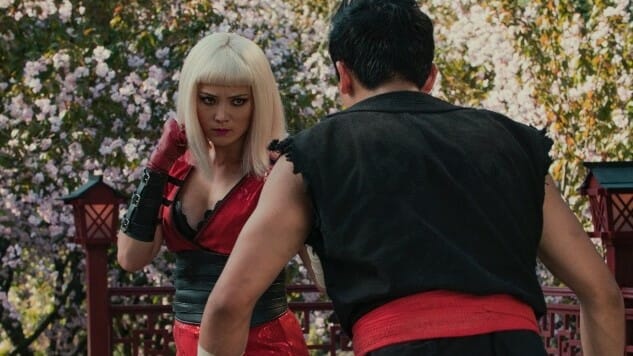“Striking Vipers” Is Black Mirror at Its Mature, Thought-Provoking, Boundary-Pushing Best
The series returns to Netflix with one of its most pitch-perfect achievements.
Photo Courtesy of Netflix
![]()
As Black Mirror returns to Netflix in a sadly truncated Season Five, largely owing to the amount of time and resources that were dedicated to the choose-your-own-adventure stylings of “Bandersnatch,” the moment has come to once again consider the show’s legacy in a world that now also contains a new version of the program to which it has inevitably been compared since the beginning: The Twilight Zone.
The first CBS All Access season of what is regularly referred to as “Jordan Peele’s The Twilight Zone,” despite the fact that Peele didn’t write or direct any of its episodes, has rightly been viewed as something of a cultural letdown. It’s not necessarily because that show’s episodes failed to capture the vibe of classic Twilight Zone installments, but rather because they have a tendency to highlight the lack of refinement in the original series’ sociopolitical commentary, when viewed through a modern lens. Suffice to say, what was classic and groundbreaking in 1960 smacks of guilelessness when repeated almost 60 years later. That’s what makes these new Twilight Zone episodes come off as feeling so superficial—their storytelling hasn’t grown up and matured with the times.
And that’s also why we should be doubling down in our appreciation for what Black Mirror has represented since it first debuted in 2011. All too often dismissed as being some kind of pale Twilight Zone imitator, it is instead a natural refinement of the ideas Rod Serling’s seminal series once espoused. Like any anthology, its quality wavers from episode to episode, but its best works tackle truly relevant themes with an emotional maturity not seen anywhere else in the “hard sci-fi” genre. And the first episode of Season Five, “Striking Vipers,” is the ideal example of what it looks like when everything goes right for Black Mirror, ranking among the series’ most pitch-perfect achievements.
At the heart of “Striking Vipers” is a pair of relationships centered around Danny (Anthony Mackie), a disheartened father who perfectly captures the mounting ennui of a late-30s, physically diminished “cool Dad” grappling with the fact that his “best years” are undoubtedly behind him. Trying for a second baby while banished to the lameness of suburbia with loving wife Theo (Nicole Beharie) and a young son, he radiates a tug-of-war between dissatisfaction and genuine appreciation for “comfortability.” That is, until the reemergence of college friend Karl (Yahya Abdul-Mateen II), who gives Danny a birthday gift of a next-gen virtual reality fighting game so the two can reconnect online.
At this point, one would be forgiven for assuming they know where “Fighting Vipers” is going. Allegorical stories revolving around the wide concept of “virtual reality” in science fiction have a tendency to focus almost exclusively on the duality between the real and the unreal, and whether the disconnect from “real life” is inherently problematic, positioning virtual interaction as invariably “less than” and frequently pathetic or shameful. Black Mirror, on the other hand, immediately leans in the opposite direction.
What is supposed to be a “fighting game” with an aesthetic borrowed equally from Street Fighter 5 and Dead or Alive, instead becomes something very, very different. Although they intend to clash fists, Danny and Karl end up locking lips instead, within the guise of their fighting game avatars—one male, and one female. The first instance of this suddenly sexualized atmosphere happens so suddenly (though organically) that it truly does take the audience by surprise, but it also highlights how naturalistically the resulting series of reactions play out. They all feel profoundly well-earned, and they spark a series of rhetorical questions about the nature of sexuality and infidelity that will no doubt make up the content of college-level human sexuality essays for decades to come. It’s of little surprise to see that “Striking Vipers” was helmed by British director Owen Harris, who also gave us the extremely well-regarded episode “San Junipero”—if anything, “Striking Vipers” feels like a spiritual sequel.
-

-

-

-

-

-

-

-

-

-

-

-

-

-

-

-

-

-

-

-

-

-

-

-

-

-

-

-

-

-

-

-

-

-

-

-

-

-

-

-








































